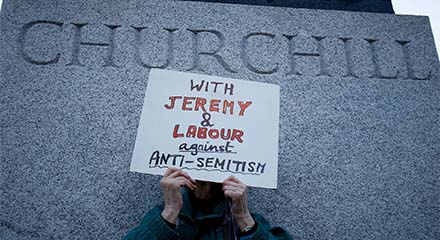Carla Roberts looks forward to the May 4 members meeting of Labour Against the Witchhunt
Any event that Labour Against the Witchhunt is putting on these days is likely to be – correctly – described as timely. The witch-hunt against Jeremy Corbyn and his leftwing supporters has now become daily and normalised. In the run-up to the local and European Union elections rightwingers in and outside the Labour Party have been busy scrolling through the Facebook and Twitter accounts of Labour candidates in particular. Naturally, they have been hugely successful in discovering ‘problematic’, often historic, posts (that were not considered problematic at all a few short years back).Liverpool council candidate Sam Gorst, for example, is now under investigation for alleged “anti-Semitism”, because it appears he tweeted something “in defence of former London mayor Ken Livingstone”. His accounts have been deleted, so we cannot tell you more about it – but if that is all, then clearly the compliance unit is going berserk. Remember, Livingstone resigned from Labour after the national executive committee decided to readmit him after a one-year-suspension. The right wing cried ‘foul’ and the Corbyn leadership was in agony over what to do with Ken. He resigned to spare Corbyn any more blushes – to no avail, of course. Because Corbyn and his allies have continuously given in to the witch-hunters rather than standing up to them, Livingstone is now ‘known’ to be an anti-Semite (as is Corbyn himself, of course).
Corbyn has also – again – been put on the defensive after somebody found that in 2011 he wrote a forward to a new edition of John A Hobson’s hugely influential 1902 book Imperialism – a study. Corbyn praised it as “a great tome”, which is “brilliant, and very controversial at the time”. Hobson was a liberal anti-war journalist who later joined the Independent Labour Party and developed a theory of underconsumption to explain capitalism’s vicious repeating cycles of bust and boom. He was also (probably) the first person to explain that the development of imperialism was the direct result of capital’s need for constant expansion. His book had an influence on Lenin, Trotsky and many socialists to this day. In 2014, The Guardian described it as the “definitive book on imperialism”.
For the Daily Mail, however, this 400-page seminal work is nothing but a “century-old book, which argued that banks and newspapers were controlled by Jews”; and Daniel Finkelstein in The Times describes it as a “deeply anti-Semitic book”.
In fact, it is a single paragraph that riled up Finkelstein (who kicked off the whole business) and it does not come “a few pages in”, as he claims – but at the end of chapter 4, where he states that, “while the new imperialism has been bad business for the nation, it has been good business for certain classes and certain trades within the nation” and goes on to describe those who “benefit from aggressive imperialism and militarism”.
He starts by listing the most obvious companies – those who produce weapons. Then there is “the shipping trade” and those from the ruling class who take up “the numerous official and semi-official posts in our colonies and protectorates”. Not to mention “the investor, who cannot find at home the profitable use he seeks for his capital, and insists that his government should help him to profitable and secure investments abroad”.
This is the context in which Hobson writes: “… still more dangerous is the special interest of the financier, the general dealer in investments”, who “use stocks and shares not so much as investments to yield them interest, but as material for speculation”. These “great businesses” were “controlled, so far as Europe is concerned, chiefly by men of a single and peculiar race, who have behind them many centuries of financial experience”. He asks: “Does anyone seriously suppose that a great war could be undertaken by any European state, or a great state loan subscribed, if the house of Rothschild and its connections set their face against it?” (my emphasis)
Of course, 120 years ago, Hobson would have used the word “peculiar” in its original meaning of “distinctive” or “characteristic of a particular group” – not in its modern sense of “odd” or “eccentric”. But no doubt he did mean the ‘Jewish race’. The point is, however, he was writing at a time when anti-Semitism was prevalent and acceptable within the ruling class. As a Labour press officer is quoted as saying, “Similarly to other books of its era, Hobson’s work contains outdated and offensive references and observations.”
But do these phrases mean that the book as a whole has no value? It is quite likely that Corbyn did not even read the whole book, but, like many others, knew of its historical importance – and, of course, as Labour’s press officer said, “Jeremy completely rejects the anti-Semitic elements of his analysis.” But there is a real danger that the current hysteria sparked by the witch-hunt is robbing people of any sense of proportion, history and rationality. Will the likes of the Daily Mail and Finkelstein start demanding the suppression of the writings of William Shakespeare, Charles Dickens, Winston Churchill and John Buchan – all redolent with anti-Semitism?
Clearly, there is tons of work to do for a campaign like Labour Against the Witchhunt.
Controversies
The members’ report produced by LAW’s steering committee for the May 4 meeting in central London makes for impressive reading. Since January 1, the campaign has produced dozens of model motions, petitions and campaigns in defence of Labour members who have been investigated, suspended, expelled and/or falsely accused of anti-Semitism – among them Chris Williamson MP, Jackie Walker, Asa Winstanley, Liverpool councillor Jo Bird and Rebecca Gordon-Nesbitt, who the NEC refused to endorse as parliamentary candidate in South Thanet.
No doubt, most prominent and effective has been LAW’s campaign for the reinstatement of Chris Williamson, who is unfortunately the only MP who has dared to stand up to the witch-hunters (and the only one who has campaigned for the democratisation of the party). LAW has managed to debunk as “fake news” the so-called ‘ban’ on Labour Party branches and CLPs discussing and passing motions in solidarity with Chris and has produced detailed advice on the issue on its website. At least 27 CLPs, eight Momentum branches and “dozens of left Labour and trade union organisations” have since come out in public support with Chris and are listed on LAW’s website, alongside supportive statements that the group has collected from Ken Loach, Alexei Sayle, Lowkey, Mike Leigh and many others.
The campaign, which has “close to 400 members”, has also managed to extract a rare apology from the Mail on Sunday over its malicious reporting of the March 25 ‘Defend the left’ meeting, where it reported Livingstone as saying: “It is not anti-Semitic to hate the Jews of Israel” – even though he was merely quoting one of the ridiculously false charges made against him! After hundreds of people complained, the paper had to print an apology. Ken Livingstone has since become honorary president of LAW, alongside founding member Moshé Machover.
LAW has also campaigned against the Labour Party’s adoption of the ‘definition’ of anti-Semitism published by the International Holocaust Remembrance Alliance, publishing a detailed position paper outlining its opposition and a number of model motions on the issue, while also highlighting a number of cases where the IHRA definition has been misused to discipline and expel union members and even sack people from work. So far, it has not been used in disciplinary cases in the Labour Party, but that is probably only a matter of time.
Slightly more controversial has been LAW’s petition fighting for the overdue implementation of the reformed trigger ballots, about which we previously reported. Not all LAW supporters seem happy with what they see as the campaign going beyond its original remit of fighting the witch-hunt.
We disagree. The Parliamentary Labour Party is stuffed with careerists, Blairites and witch-hunters, who are openly hostile to Jeremy Corbyn and have been busy sabotaging his leadership from day one. Given the chance, members in most localities would have chucked out rightwing MPs years ago. But now the NEC – in an attempt to stop more rightwingers from defecting to Change UK – is dragging its heels when it comes to implementing a timetable for trigger ballots (which is the only way a sitting MP can be deselected). Should there be another snap election without re-selections, the PLP’s political composition will probably remain unchanged. Almost 1,500 people have signed the petition, so there is clearly some appetite for this important issue.
Similarly, some LAW supporters have criticised the fact that the May 4 meeting will discuss a motion on ‘George Galloway and EU elections’. The motion objects to Galloway’s call for a vote for “Nigel Farage’s Brexit party”, because it is “a vote for rightwing chauvinism and an anti-migrant stance”. It also emphasises that LAW – of course, given the name and its campaigning priorities – calls for a vote for the Labour Party.
Judging by the number of those, including some LAW supporters, who have expressed sympathy for Galloway’s call, I think it will be useful to discuss the issue. There are plenty of illusions on the left that Corbyn can introduce ‘socialism’, once Britain has finally been able to free itself from the ‘shackles of the EU’. This is not just mistaken about the way global capitalism works, but also a serious misunderstanding of Corbyn’s rather reformist and tame politics.
The meeting will also discuss if Peter Gregson should be expelled from LAW. In the past, the campaign has published a number of statements in Gregson’s defence – for example, protesting against his expulsion from the GMB union – while also criticising his often slapdash use of language. In March, Gregson posted an update to one of his petitions, which he also sent to a number of LAW members and supporters, in which he urged people to read the article, ‘UK’s Labour anti-Semitism split’, by Ian Fantom (founder of the Keep Talking campaign).
As LAW’s Tony Greenstein then pointed out in a long email exchange with Gregson, in this article Fantom makes reference to “my colleague, Nick Kollerstrom”, who “had been targeted in a witch-hunt” for a positive review he wrote of a book about Auschwitz and the “gas chamber illusion”. Tony advised Gregson to take down the reference to Fantom’s article, arguing:
The title of Kollerstrom’s article – ‘The Auschwitz “gas chamber” illusion’ – speaks for itself. But anyone with any doubts needs simply read the first sentence: “This essay will argue that well-designed cyanide gas chambers were indeed present at Auschwitz, and did work efficiently, but that they were operated for purposes of hygiene and disinfection, in order to save lives and not take them.”
Tony goes on to explain why this is not a question merely of ‘freedom of speech’: “It is incredibly damaging for LAW or anyone else to have the slightest contact with you if you maintain these links and I would ask for an immediate assurance that you will cut these links.”
To cut a long email exchange short, Gregson refused Tony’s request and as a result Tony deleted him from the ‘Unofficial LAW Facebook group’, where he is the main administrator. Gregson then stupidly published the whole exchange on his website (including bad-tempered comments by LAW members who wanted to be deleted from the exchange), where it was picked up by the Jewish Chronicle, which gleefully reported the whole disagreement.
As the steering committee’s motion proposing Gregson’s expulsion points out, “We do not believe that Peter Gregson should be expelled from either the GMB union or the Labour Party. These are broad organisations of the working class that contain many different viewpoints.” But LAW, however, is a campaign with a rather narrower political focus and therefore needs to “confront any hint or trace of genuine anti-Semitism in our ranks. We do not wish to be associated and tainted with holocaust denial”.
Left
In its lead motion, LAW quite rightly calls out the Corbyn leadership’s “short-sighted and futile attempt to appease the right”, which “can only undermine the Corbyn leadership and often plays into the false ‘Anti-Zionism equals anti-Semitism’ narrative”. Momentum is described as “unfit for purpose”.
Therefore, LAW will support efforts to
build an alternative Labour left that organises democratically and transparently; both supports Corbyn against attacks by the right, and is independent and able to criticise the leadership when necessary; and is consistently anti-racist and internationalist – a stance which by definition includes anti-Zionism and supporting the Palestinians.
The steering committee proposes a campaign for the “disaffiliation of the Jewish Labour Movement from the Labour Party and for Labour CLPs and trade union branches to affiliate to LAW and Jewish Voice for Labour”. I understand that there will be at least one amendment opposing the first part of the sentence.
We welcome the fact that LAW proposes to campaign for “the scrapping of all bans and proscriptions” within Labour, because “if the mass of socialists in Britain joined the party, it would put us in a much stronger position in the ongoing civil war within the party”.
We are looking forward to what is shaping up to be an interesting meeting, though it could well get rather heated at various times. But that is not a problem. Meetings within the labour movement should feature open discussion around controversial issues. Instead of burying our disagreements thanks to compromise formulations, we need to debate them out honestly.




